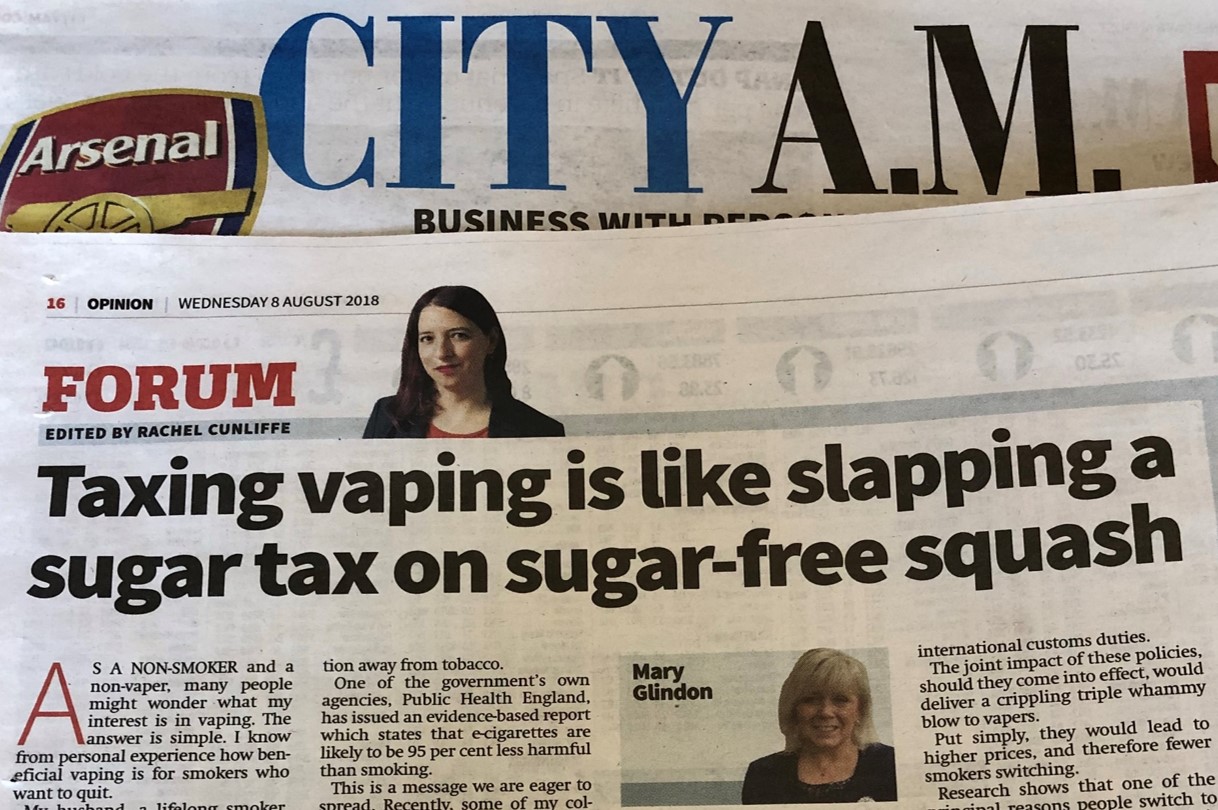Following the reports that the Treasury planned to impose a new ‘sin tax’ on vaping as part of the next Autumn Budget, the UKVIA worked with Mary Glindon MP to secure an OpEd in the City A.M.
With support from the Labour MP, the UKVIA now have a wide range of key voices in opposition to the proposed tax, including leading think tanks, industry bodies and Parliamentarians.
Taxing vaping would be like extending sugar tax on sugar free squash
Mary Glindon MP, City A.M.
As a non-smoker and a non-vaper, many people might wonder what my interest is in vaping. The answer is simple. I know from personal experience how beneficial vaping is for smokers who want to quit. My husband, a lifelong smoker, switched from smoking to vaping two years ago, mainly for his health. He hasn’t had a cigarette since. I have also heard many stories in my surgery about how constituents have successfully managed to quit their smoking habits for good, through vaping, and it is clearly an effective way to improve our nation’s health. That’s why I decided, together with my parliamentary colleagues, to join the APPG for E-Cigarettes, to further investigate how vaping could complement the government’s smoking cessation strategy.
To date, the UK has been leading the way in the battle against smoking related illnesses through public health policies which support smokers wishing to quit with the help of vaping. Vaping products are a uniquely interesting innovation as their uptake has been entirely consumer-led. They have already helped millions of people reduce or stop smoking and, at zero cost to the NHS, have saved the health service vast amounts of money.
Consensus on this amongst our country’s health professionals is fairly widespread. Public health experts agree on the benefits of vaping as a tool to help smokers transition from tobacco and one of the government’s own agencies, Public Health England, issued an evidence-based report which stated that e-cigarettes are likely to be 95% less harmful than smoking.
Recently, some of my colleagues have given evidence to MPs in Australia (where vaping is banned), and it was great to see that the UK’s success in encouraging vaping is being recognised around the world. It should be a source of national pride that we in the UK listen to our doctors, and the evidence, when developing public health policy.
I was therefore very surprised to hear worrying reported rumours from Whitehall that government might be considering imposing a ‘sin tax’ on vaping, which would be in stark contradiction to the government’s own messaging to date. Such a move would risk undoing all the great work that has been done to date to encourage smoking cessation.
As lawmakers, we often use the taxation system to nudge the public towards living healthier lifestyles, hence the so-called ‘sin taxes’ on cigarettes, alcohol and sugar. Whether or not you agree with the principle of the government engaging in behavioural economics, a “vape tax” would have a regressive impact on public health. It would make no sense to on the one hand encourage people to switch whilst on the other apply further tax on it. Frankly, it would be akin to extending the ‘sugar tax’ to sugar-free squash!
The proposed ‘vaping tax’ news comes at the same time as international pressures are mounting on the industry, with the EU consulting once again on whether to place an excise duty on vaping; the World Health Organisation encouraging countries to ban vaping as part of anti-smoking strategies; and the World Customs Organisation considering whether vaping should be re-classified to pave the way for international customs duties. The joint impact of these policies, should they come into effect, would deliver a crippling triple whammy blow to vapers. Put simply, they would lead to higher prices and therefore fewer smokers switching.
Research shows that one of the principal reasons people switch to vaping from smoking, is that it is substantially cheaper. My husband was amazed at how much money he saved by switching to vaping. But without this financial incentive, it would be far less likely that many smokers will change to e-cigarettes, and more likely they would decide to stay with what they know.
But I know, and what so many of my colleagues in Parliament who regularly discuss this area know, is that smoking severely damages your health and puts huge pressures on our health service. That is why it is so important that we continue to pursue effective harm-reduction policies. A vape tax would fly in the face of that goal.
As a nation, we now have an opportunity to lead the world on public health. If statistics show that vaping can make a positive contribution to our health, and they do, then it is vitally important that we keep the cost of vaping well below that of cigarettes. There are almost 7 million smokers in the UK and, if the government is to help them stop, then vaping must play a key part of the solution.

